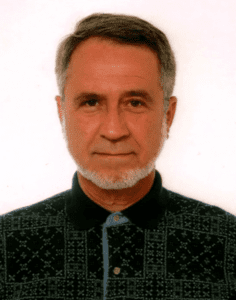
We’re lucky to live in a country where we’re blessed with the freedom to express and be ourselves. Robert Carr, DD alum and author of A Question of Return, knows this firsthand. Fleeing Communist Romania at 24, Carr travelled through Bulgaria, Turkey, France, and Israel before settling in Canada. His books probe themes of oppression, displacement, and the way autocratic regimes can leave an imprint on a person long after they’ve left the regime behind.
We spoke with Robert about his latest novel, what inspires him, and how he got his start.
Diaspora Dialogues: Tell us about your new book.
Robert Carr: A Question of Return opens in mid-1980s Toronto, where Artyom (Art) Laukhin, a Soviet poet famous worldwide but no longer able to publish in his own country, works toward transforming his father’s notes kept between the mid-1930s and the late 1950s into a publishable literary journal. A writer of popular spy stories much enjoyed by Stalin himself, Laukhin’s father had been in the middle of the Soviet literary life and had kept a secret record of it.
Among the explosive journal entries are those of the last two years in the life of the Russian poet Marina Tsvetayeva, including her return to the Soviet Union in 1939, her discovery that her husband had been a KGB agent, her agony over the arrest and disappearance of both her daughter and her husband, and her inability to find proper work to put a roof over hear head. As entries detail Tsvetayeva’s slide toward a terrible end, they also reveal a callous indifference from her friends and fellow artists. Among these, remarkably, is Boris Pasternak, who, years later, undertakes a remorseful journey to the small town on the Kama River where Tsvetayeva died.
The first volume of the journal is only a few months away from printing. Laukhin teaches, reads the proofs, works on a long introduction, gives interviews. He worries that his days as a poet are over. He falls in love. He suspects a shady dealer of selling KGB-confiscated art. As Laukhin links and revises the Tsvetayeva-related journal entries into a separate narration about the poetess requested by his literary agent, the past encroaches into the present of Laukhin’s life.
When did you realize you had a passion for writing?
I began writing fiction in 1998, somewhat late in life and almost by accident, prompted by a desire to record my mother’s stories about her family and childhood. I found I enjoyed doing it and decided to make writing a part of my life.
In August 2007, I retired in order to write full time. My first novel, Continuums, was published in the fall of 2008. A Question of Return was published in November 2015.
I live with my wife in Toronto. She has been very supportive of my (late) career switch.
How did you find time to write while working? How has it changed since you became a full-time writer?
As many writers, I began with short stories. I wrote them and I wrote Continuums, my first published novel, while I was still working full-time as an engineer. As a result, I wrote mainly during weekends and vacations. Sometime, but not often, I wrote very early in the morning because I’m an early riser. I might have done things in the evening too, but mostly mechanical, housekeeping kind of work.
It’s different now, retired from engineering and writing full time. I’m a morning person, and, if I’m writing, it’s usually in the morning.
What pieces of writing / authors have had the greatest impact on you?
I don’t know which ones had the greatest impact on me. There are, obviously, writers I love and admire. It easier for me to list books that I love rather than authors. Top of my list is Isaac Babel, and of him I can say I love everything he wrote, or just about. Of course, he wrote very little, or little that had reached us. I love Alice Munro, and am baffled by the way she does her magic. By and large, British writing is more appealing to me than North American writing.
What are some of the biggest challenges you’ve faced as a writer?
English is not my native language so gaining the confidence and a feel for what I write was not easy.
These days, with literary fiction in less demand and the reduction of book sections in newspapers and magazines, a big challenge is to get the attention of book critics.
What’s next for you?
Corby Falls is the tentative title of the novel I’m currently working on. It has as protagonist a minor character from A Question of Return and could be viewed as a sequel to it.
This interview has been edited for length and clarity.
